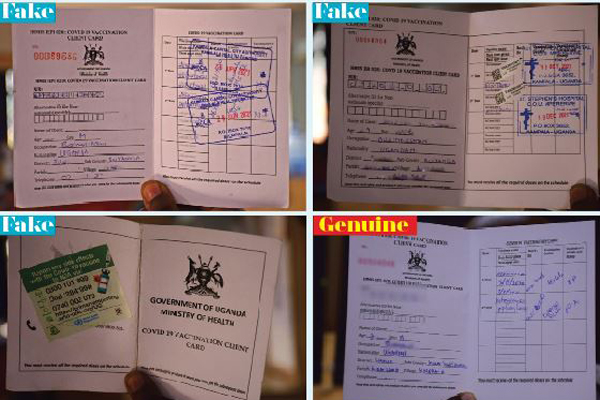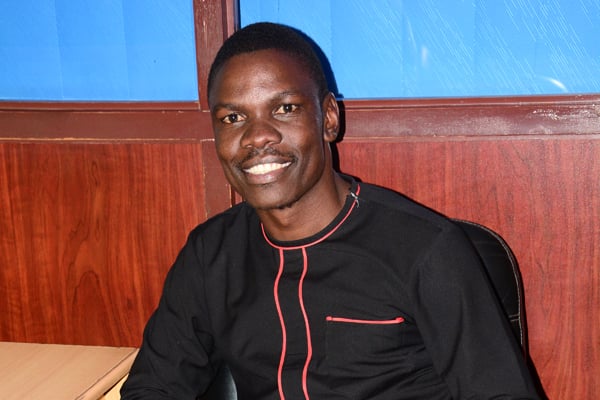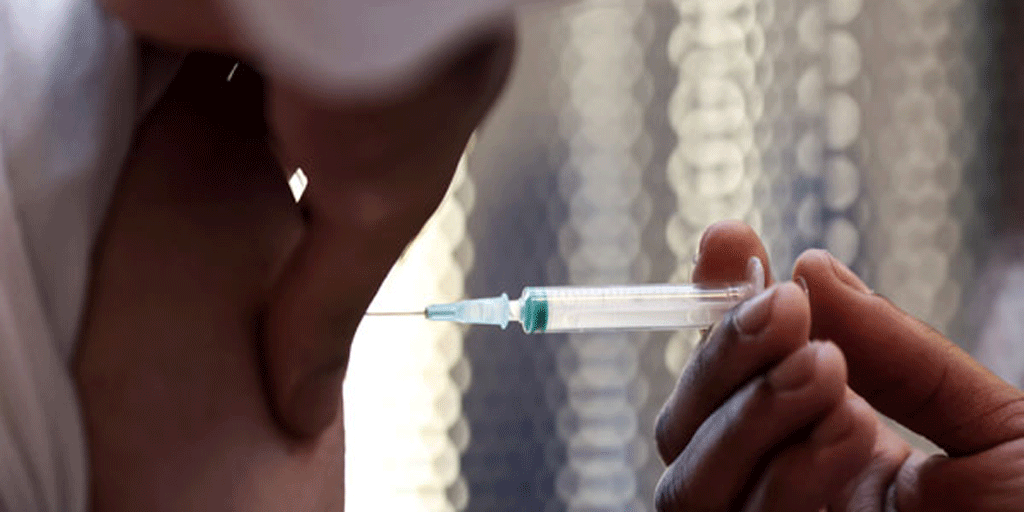Prime
Fake Covid-19 cards sold on open market

People go about their businesses on Nasser Road in Kampala yesterday. The street is a hub for printing businesses, including book legers, receipt documents, file folios, business cards and identification cards of all kinds. PHOTOS / ABUBAKER LUBOWA
What you need to know:
- Suspicious that they could be arrested, the dealers use their proxies to negotiate prices and specifications, who upon execution of the job, deliver the forged certificates bearing stamps and seals, depending on the client’s specifications.
The coronavirus pandemic is far from over as forged Covid-19 vaccination cards and Covid-19 certificates are being sold exorbitantly on the open market to unvaccinated Ugandans, Daily Monitor has established.
The bustling Nasser Road, famous for its printing businesses, is one of the open spaces where the sham transactions are being effected.
The certificates, which are freely issued once one is vaccinated and a preserve of referral hospitals and health centres, now go for between Shs40,000 for ordinary and Shs200,000 for express orders.
Some traders on Nasser Road replicate anything as long as money is involved, including hospital stamps and stickers.
Suspicious that they could be arrested, the dealers use their proxies to negotiate prices and specifications, who upon execution of the job, deliver the forged certificates bearing stamps and seals, depending on the client’s specifications.
Others deliver the client to the technical person, who interrogates why he needs the cards.
What this means, however, is that unvaccinated people stand higher chances of infecting the vaccinated ones, including learners who are due to report to schools next week.
Bursting racket behind fake cards
Daily Monitor conducted an undercover survey over the last one week to establish the extent of the vice and our reporter found out that they are selling like hot cake.
This reporter went out to try and acquire at least three vaccination cards from different locations on Nasser Road and executed the mission successfully.
By 9am on Tuesday, this reporter makes his way through the busy street in search of the places where he could get a forged vaccination card.
A middle aged man beckons him over, asking what kind of service he would require.
On telling the service provider that the reporter needs a vaccination card, the tone and the body language of the service provider changes momentarily.
He drags the reporter into a darker place before he asks him what he wants the card for.
“I can get you a card but how much do you have? You need to be careful because we can get you the new cards, which have barcodes and those are more expensive. But we have the old version and these are not easily traced,” the man says.
Later, it is discovered that the man is a broker, who is looking for customers before he delivers them to the technical person, who asks harder questions.
The broker then leads this reporter to the next person, who is sitting in one of the buildings on Nasser Road.
In the building, a bench is set for people coming for the services, one has to wait for a couple of hours before they are called.
The four people in the queue, three who look to be in their 60s and another in his 40s, are looking for fake vaccination cards.
As I wait for my turn to enter the room, other people are brought in by different agents.
It feels like one having an interview for a visa.
While in the office, you are asked if you are going to travel or which kind of office you are going to so as they can stipulate which kind of card you need.
“There are specific places which are very strict and they can scan the barcode on the new vaccinations, in such places we recommend that you take the old one which only has a serial number,” the friendly man clad in a white shirt and black pair of trousers, says.
For instance, all the people who say they want to access the Ministry of Health, State House, airport and selected big offices, are advised to get the older vaccination cards, which don’t have the barcodes and would be easy to part with because they are not easily traced.
For other places such as Parliament, schools and most public hospitals, the cards with a barcode will help because there is not much scrutiny, the service providers at Nasser Road say.
The prices
The charges for the cards with the barcodes are anywhere between Shs80,000 and Shs120,000, while those with serial numbers which were issued earlier by the Ministry of Health go for between Shs50,000 and Shs80,000. For express, they go for as high as Shs200,000.
At this point, the reporter opts for the barcode card, which the service provider is willing to give at Shs100,000. After a long time of bargaining, they reluctantly offer the card at Shs85,000.
The service provider asks for the National ID from which he copies the details before he asks for 10 minutes to finish his work.
After close to 20 minutes, he shows up with the card wrapped in an old newspaper.

A display of counterfeit Covid-19 vaccination cards that our reporter bought from Nasser Road and a genuine one issued by Ministry of Health. Photos / Lubowa Abubaker
The card he presents has two barcodes and a green sticker at the back containing contact details of National Drug Authority (NDA) and other logos.
Our investigations can authoritatively reveal that the fraudsters have all stamps for major public and private hospitals across the country.
The hardest stamp to get, according to them, is the one for Mulago National Referral Hospital and if you are to get it, you have to wait a little longer or pay an extra Shs15,000 to have it in time.
Although the reporter asks to have a vaccination card with a stamp of Mulago hospital, he is instead given one from St Stephen’s Hospital CoU found in Mpererwe, a Kampala City suburb, indicating doses given on October 10 and December 10, 2021, respectively.
Getting second card
For the second card, the woman who is sitting at the reception inside a mall asks this reporter to identify himself and make sure he is not a spy, who could land them into trouble.
“If you take this card and they arrest you, we don’t know you and you don’t know us. You ought to carry your own cross. We are only helping you people who probably fear the injection of the jab,” she says candidly.
After agreeing to pay Shs50, 000, she calls the technical person, who directs the reporter to sit in a corner and wait for the card for more than seven hours.
“I am in a hurry and I can’t wait to go for my meeting because I am on appointment,” the reporter pleads.
A short, black man accepts to do the work but says he has a card which is almost complete but cannot be released. He later accepts to issue the card on condition that the reporter brings more customers for him.
The vaccination card bears the stamps of Kampala Capital City Authority, Kawaala Health Centre with vaccination dates reading April 26, and June 28, 2021.
Third vaccination card
Our investigations also revealed that someone can get an empty card with stamps and you write the information about yourself on your own. Unlike the other service providers, the one we went to for the last vaccination card offered to give us an empty card, only bearing a stamp for Shs35,000.
On this particular one, the service provider indicated that the most important thing that I need on the vaccination card, which cannot be found anywhere, is the stamp.
“The other information of which vaccine and the barcodes for it can be got from other cards of your friends. The other information is easy to get and you copy it from your National ID and you will not be disturbed by anyone,” he says and he picks the card from his pocket to hand to me.
The card has a stamp belonging to Kawempe hospital showing the first dose as having been received on April 4 and the second one on June 4, 2021.
Govt response
Asked about how this vice is being dealt with at the different points, Mr Emmanuel Ainebyoona, the Ministry of Health spokesperson, told this newspaper that they are working on a mechanism which will provide information on one’s phone giving their vaccination status.
“After one is vaccinated, they are given a card and a certificate, which has a serial number that can be verified. The other cards have a serial number which can be scanned and verified. The ministry is coming up with a system which will be available on phones such that the authorities will verify through their machines using your phone,” Mr Ainebyoona said.
Although he does not give specifics of when the systems will start operating, Mr Ainebyoona says they are working together with the police to arrest and prosecute the criminals.
Mr Luke Owoyesigire, the Kampala Metropolitan deputy police spokesperson said that they are aware of the crime and have been arresting people who are caught forging the vaccination cards.
“We know who they are and where they operate from, we are going for them anytime. They started by forging the testing certificates, especially the immigrant workers. We arrested them and produced them in courts of law and now we are going for those working on the cards,” Mr Owoyesigire said.
Mr Owoyesigire did not, however, give the numbers of the culprits so far arrested and where they operate from, but he said they would inform the public of details once they arrest them.
Nasser Road is a hub for printing businesses, including book legers, receipt documents, file folios, business cards and identification cards of all kinds.
Steps for acquiring a fake card
● You are met by an agent to whom you explain what you want
● The agent takes you to a broker, who quizzes you on why you want the vaccination card.
● When you give a substantive reason, you negotiate the price.
● You are then taken to the printer person, who asks for your details on the National ID
● Make half payment of the cash
● You wait for close to 20 minutes before the card is brought to you, upon which you pay the balance.
● The card is wrapped in a paper to disguise the transaction
What the fraudsters have
● Stamps of hospitals
● Barcodes
● Empty cards
● Serial numbers
Money involved
● Cards with barcode cost between Shs80,000 and Shs120, 000
● Cards without barcodes cost between Shs50,000 and Shs80,000
● Empty card costs Shs35,000





